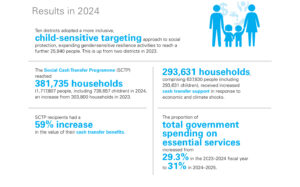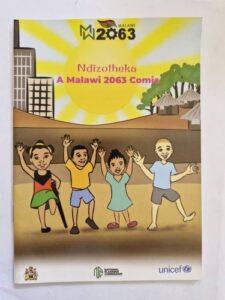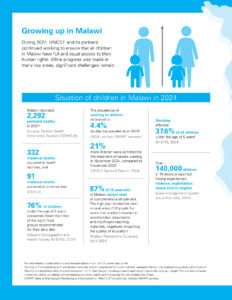
* Over 148,664 cases of children having experienced violence, exploitation, abuse and/or neglec were reported in 19 districts in 2024
* High rates of violence and exploitation were reported across the country in 2024, and the social service workforce continues to be overstretched
* Economic pressures have led to increased incidences of child labour, particularly in rural areas, where children are often engaged in agriculture or informal sectors
By Duncan Mlanjira
Violence against children remains a pressing issue in Malawi as over 148,664 cases of children having experienced violence, exploitation, abuse and/or neglec were reported in 19 districts in 2024 — up from 49,900 in 2023.

Advertisement
This is contained in United Nations Children’s Fund (UNICEF)-Malawi’s report on the situation of children in Malawi in 2024 published on the UNICEF Malawi website — under social and behavioural change — saying “the increase reflects consistent efforts by UNICEF to raise awareness of the impact of violence on children and women and of existing channels for reporting such violence.
“High rates of violence and exploitation were reported across the country in 2024, and the social service workforce continues to be overstretched. Economic pressures have led to increased incidences of child labour, particularly in rural areas, where children are often engaged in agriculture or informal sectors.”
UNICEF reports that in response, the Malawi Government “has pledged to lead and support a periodic survey on violence against children, which will provide new evidence on the magnitude of the issue and subsequently inform the development of the new National Child Protection Strategy for 2025–2028”.
“The government announced its pledge in November 2024 at the Global Ministerial Conference on Ending Violence against Children in Bogotá, Colombia.”

The UN agency emphasises it works to empower families by giving them more control over decisions that affect their lives, through community-based social and behavioural change (SBC) interventions.
“In 2024, such interventions in areas of girls’ education, nutrition, hygiene promotion and immunisation reached over 10 million people and contributed to an increased demand for measles and human papillomavirus (HPV) vaccine services, improved infant and young child feeding, and a greater uptake of cholera prevention practices.
“The girls’ education interventions contributed to girls’ enhanced participation in school and community activities and to child rights advocacy. UNICEF supported the development of a community engagement toolkit for front-line workers promoting positive care practices — the toolkit is now ready for field testing.
“Social listening, conducted through community volunteers and online platforms, effectively monitors misinformation and gathers feedback on key issues. Over 10 million people were reached through community-based SBC interventions in girls’ education, nutrition, hygiene promotion and immunisation.”

Child-friendly, inclusive, resilient communities
UNICEF also reports that it supports the government in creating communities in which all children can flourish in secure, healthy and sustainable environments, and in empowering communities to break the cycle of poverty.
In 2024, UNICEF moved from generating evidence on child poverty to actively leveraging that evidence in shaping national perspectives on child-inclusive programming that can holistically address children’s multifaceted deprivations.
“This shift is cultivating a child-focused mindset among ministries, departments and agencies while helping to ensure the integration of child poverty more broadly into public finance management and decentralised policies and planning, including district development plans and district implementation plans.
“UNICEF also successfully contributed to the design and launch of the National Decentralization Policy to assist local government authorities and actors in better understanding child rights issues and translating knowledge into practice towards effective programmatic outcomes for children.
Research systems, evaluation and knowledge management
In support of government’s broad dissemination of the MW2063 national vision’s implementation of the Malawi Implementation Plan for 2021–2030 (MIP-1), UNICEF-Malawi engaged children to understand the MW2063 MIP-1 through comic books.

This is under its intervention towards strong research systems, evaluation and knowledge management— which are Malawi’s development agenda as expounded in MW2063’s phased vision for the future.
UNICEF further reports that other United Nations (UN) agencies in Malawi contributed to the 2024–2028 United Nations Sustainable Development Cooperation Framework (UNSDCF), the Common Budgetary Framework (CBF) and the 2024 Results Framework.
“UNICEF also ensured that these frameworks aligned with its new country programme in Malawi (2024– 2028) and that UN efforts aligned with national efforts to achieve MW2063, MIP-1, the 2030 Agenda for Sustainable Development and the African Union’s Agenda 2063.

Advertisement
“UNICEF contributed to strengthening national evaluation systems through capacity building of government monitoring and evaluation (M&E) officials and through its support for the launch of a new M&E policy and the development of a national evaluation plan.
“The national evaluations will examine how programmes have addressed the multiple deprivations facing children and help establish accountability. In addition, UNICEF empowered young researchers from the Malawi University of Science & Technology (MUST) to design evidence-based solutions to common challenges.
“The intervention enhanced the researchers’ critical thinking and problem-solving skills, equipping them to address pressing issues.”
The report adds that 48 young researchers from MUST designed and developed 14 innovative, research-based solutions addressing key issues such as water, sanitation and hygiene (WASH) and menstrual health for girls.
UNICEF also supported capacity building of 28 government M&E officials, whose courses covered the basics of evaluation, M&E planning and implementation, evaluation oversight, and ethical standards.

Advocacy
UNICEF reports that it played a crucial role in 2024, in establishing the National Children’s Commission (NCC) and operationalising its Secretariat after shortly after the government submitted its report to the Committee on the Rights of the Child.
“UNICEF supported the NCC’s structure, contributed to the development of its annual work plan, and raised awareness nationwide about the commission and its work [and] continued to advocate for increased and sustained government investment in adolescent health — as well as maternal and newborn health services.
“These efforts were driven through strategic, high-level engagements, including direct dialogue with the Minister of Health and active participation in key multi-stakeholder platforms convened by the Ministry.
“Malawi’s macro-fiscal challenges – including unsustainable debt, foreign exchange shortages and inflation – threatened social sector investments. Consequently, UNICEF advocated for protecting social sector spending and mobilising resources.
“Strategic partnerships with the government and CSOs drove reforms and secured funding for inclusive social protection systems. Evaluations of programmes like the SCTP led to improved designs and expanded coverage.”
UNICEF further says it contributed to early HIV diagnosis and treatment through advocacy for Malawi’s triple elimination agenda — through capacity building for district PMTCT focal points, and by assisting efforts to strengthen PMTCT data management in high HIV burden districts.



Advertisement
